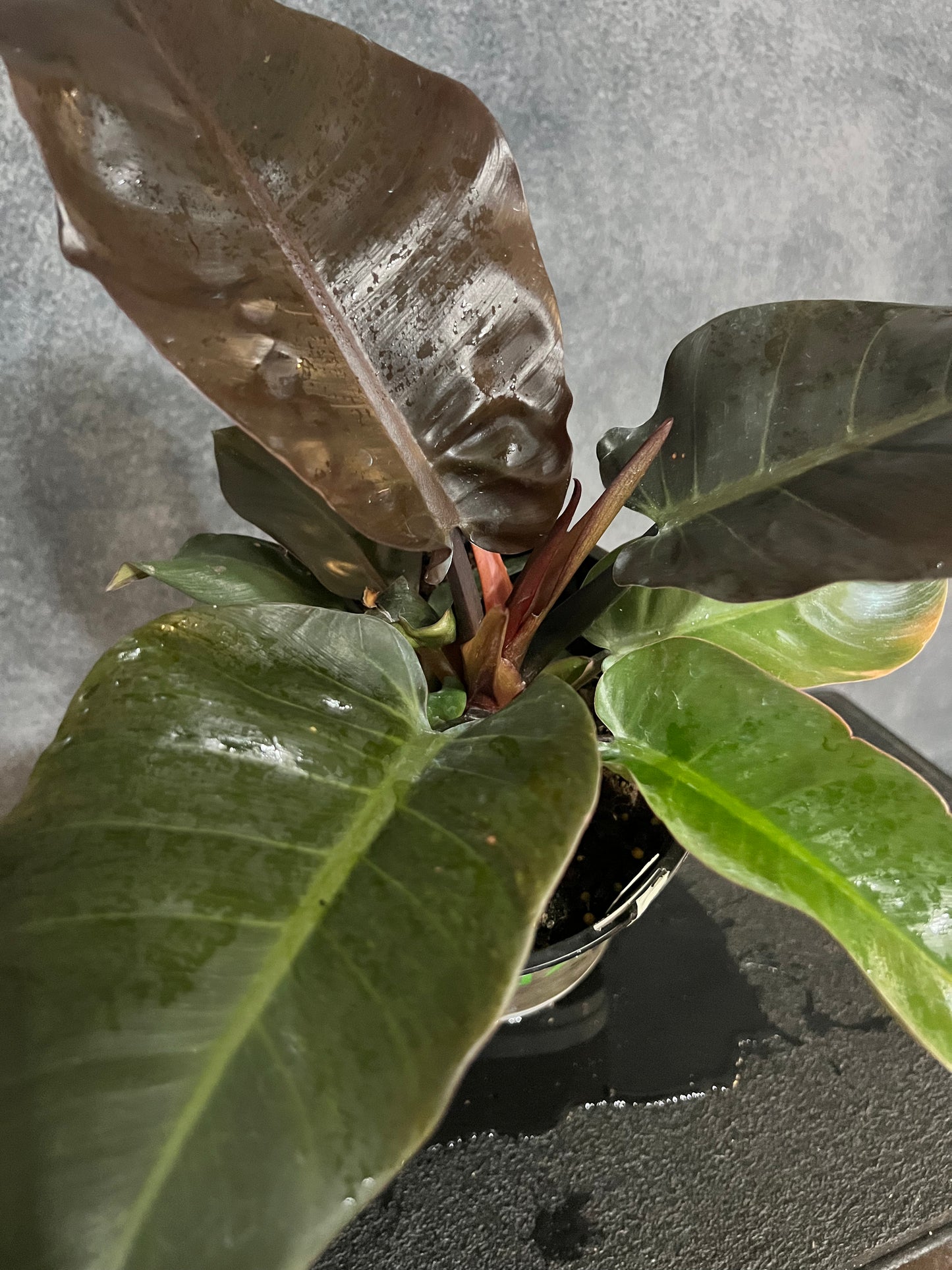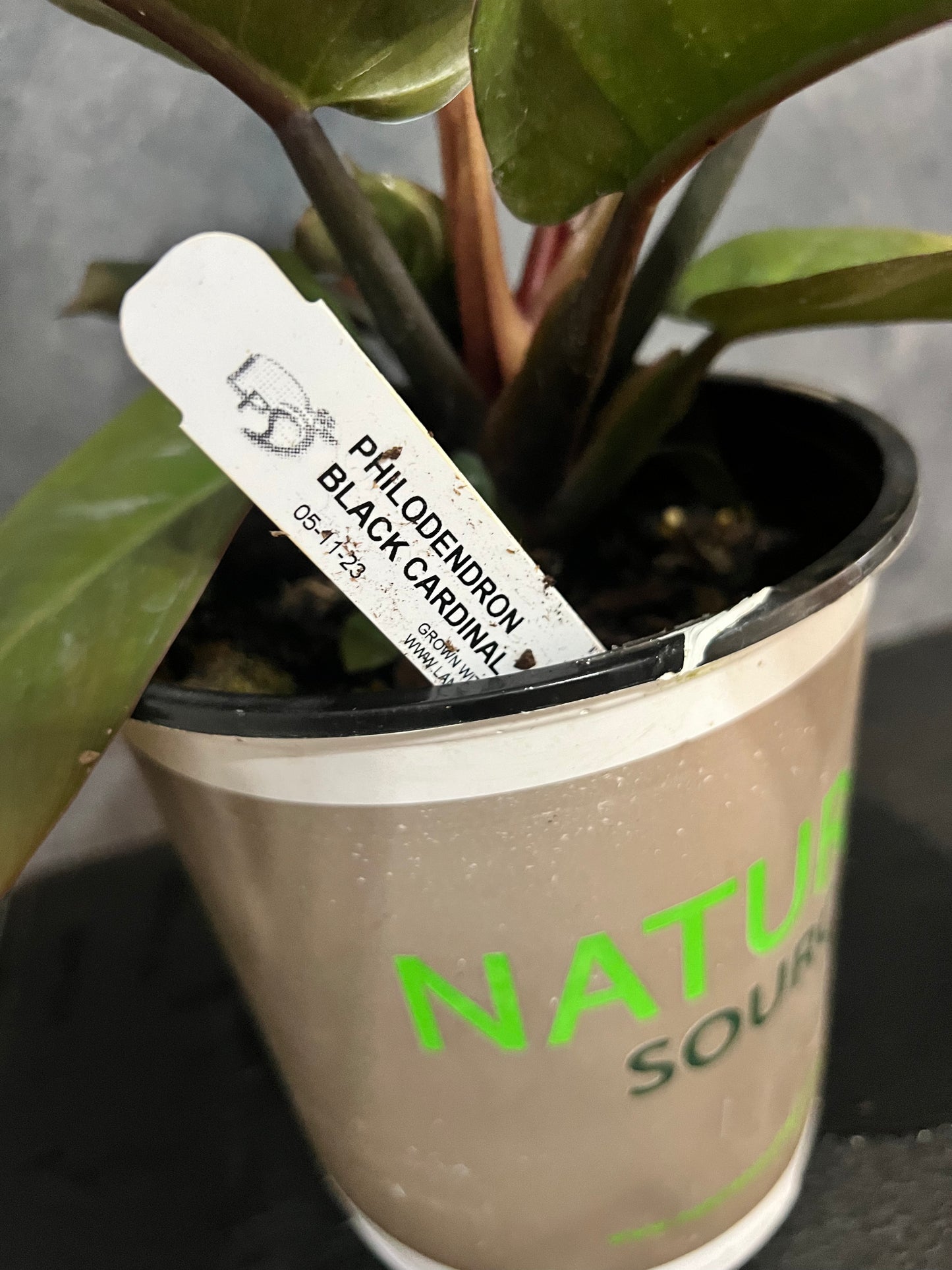Philodendron Black Cardinal
Philodendron Black Cardinal
Philodendron 'Black Cardinal' is a striking tropical plant valued for its deep burgundy to nearly black foliage and compact growth habit. It’s an excellent choice for indoor gardening, as it thrives in low-light environments and is relatively easy to care for. This self-heading philodendron doesn’t climb like many other varieties, making it ideal for pots and indoor settings.
Plant Description:
- Foliage: The leaves are large, glossy, and oval-shaped. When new leaves emerge, they have a bright burgundy or reddish color and gradually darken to deep green or almost black as they mature. The contrast between the new and old leaves adds dynamic color to the plant.
- Growth Habit: Philodendron 'Black Cardinal' is a self-heading variety, meaning it grows in a rosette-like form rather than trailing or climbing. The plant has a compact, bushy habit, typically growing upright.
- Stems: The stems are thick and sturdy, supporting the large leaves.
Growing Conditions:
- Hardiness Zones: USDA zones 10-12 for outdoor growth. It’s primarily grown as an indoor plant in most regions but can be grown outdoors in tropical climates.
- Height: 24 to 36 inches (60 to 90 cm) when grown indoors, although it can grow taller in ideal outdoor conditions.
- Width: 24 to 36 inches (60 to 90 cm).
- Sun Exposure: Prefers bright, indirect light but can tolerate lower light conditions. Avoid direct sunlight, as it can scorch the dark leaves. In low light, the plant’s growth may slow, but it will still maintain its attractive appearance.
- Soil: Use well-draining, rich potting soil. A mix designed for aroids or tropical plants that includes peat, perlite, and orchid bark is ideal. Good drainage is essential to prevent root rot.
- Watering: Keep the soil consistently moist but not soggy. Allow the top inch of soil to dry out between waterings. Overwatering can lead to root rot, so ensure the pot has drainage holes.
- Humidity: Thrives in high humidity, though it can adapt to average indoor humidity levels. Misting the plant or using a humidifier can help in drier environments.
- Temperature: Prefers temperatures between 65-80°F (18-27°C). Avoid cold drafts or temperatures below 55°F (13°C).
Planting and Care Tips:
- Planting Time: As an indoor plant, it can be planted at any time. If growing outdoors, plant in spring or summer in warm climates.
- Repotting: Repot the plant every 2-3 years or when it becomes root-bound. Choose a pot that is 1-2 inches larger in diameter than the current one, and refresh the soil with each repotting.
- Fertilization: Feed with a balanced liquid fertilizer during the growing season (spring and summer) every 4-6 weeks. Reduce fertilization in fall and winter when the plant’s growth slows.
- Pruning: Prune dead or damaged leaves as needed to keep the plant looking tidy. If the plant grows too large, it can be pruned to control its size, but typically 'Black Cardinal' maintains a manageable growth rate.
- Pests: Philodendrons are generally resistant to pests, but occasional infestations of spider mites, mealybugs, or aphids can occur. Wipe down leaves with a damp cloth or use insecticidal soap if needed.
- Indoor Plant: 'Black Cardinal' is a popular houseplant due to its dramatic foliage and tolerance of low light. It’s perfect for offices, living rooms, or any indoor space where a bold, low-maintenance plant is desired.
- Tropical Gardens: In tropical climates, it can be used as a focal point in garden beds or containers. Its deep color provides contrast to brighter tropical plants.
- Container Gardening: Its compact size and slow growth make it ideal for pots, adding a modern touch to indoor or outdoor spaces.
- Air Purification: Like other philodendrons, 'Black Cardinal' helps purify indoor air by removing toxins such as formaldehyde and benzene.
Native Range:
Philodendrons are native to the tropical rainforests of Central and South America. They grow in the understory of forests, where they receive filtered light and high humidity. While 'Black Cardinal' is a hybrid and not found in the wild, its parent species originate from these tropical regions.
---SHIPPING NOTICE PLEASE READ BEFORE PURCHASING LIVE PLANTS!---
We WILL NOT refund the purchase of or the shipping cost of live plants purchased with the intent to be shipped to states that do not authorize importing live plants or to states with restrictions! Purchases to these states will be held for 30 days for pick-up at our Slidell, Louisiana store and the shipping cost associated with these purchases will be held for the care of the plant while waiting to be picked up. All sales are final. If the plant(s) purchased are not picked up within 30 days from the date of order, these items will be returned to our sales inventory and you WILL NOT be refunded. Thank you for understanding these policies.
Due to regulations, certain states have restrictions on importing plants. Please review the list below to ensure you're not attempting to order any restricted plants in your area.
**Important Note:** We do not ship any plants outside the U.S.
State-Specific Restrictions - We ARE NOT responsible for any plant(s) that are not listed in these restrictions. Purchaser bears all responsibility for making sure the plant(s) they desire to purchase are not banned from being imported to the shipping state:
Arizona: Juglans spp.
California: Castanea spp., Juglans spp., Pinus spp., Quercus spp.
Colorado: Some counties restrict Prunus spp. Please verify your local county regulations.
Florida: Castanea spp., Cornus spp., Quercus spp., Cornus mas
Georgia: Vaccinium spp.
Hawaii: Pinus spp.
Idaho: Humulus lupulus, Mentha spp., Vitis spp.
Indiana: Fragraria spp., Rosa spp.
Kansas: Juglans spp.
Michigan: Abies spp., Vaccinium spp.
Montana: Pinus spp.
Nevada: Allium spp.
Mentha spp.
New Jersey: Rosa spp.
New York: Vitis spp.
Oregon: Allium spp., Castanea spp., Corylus spp., Humulus lupulus, Quercus spp., Sambucus nigra, Ulmus spp., Vaccinium spp., Vitis spp.
Texas: Juglans spp.
Washington: Allium spp., Castanea spp., Corylus spp., Humulus lupulus, Vaccinium spp., Vitis spp.
Wisconsin: Abies spp., Pinus spp., Picea spp., Mentha spp.
Additionally, we cannot ship plants in soil medium to the following states: AK, AL, AR, AZ, CA, HI, ID, KS, MS, MT, ND, NM, NV, OK, OR, SD, TX, UT, WA.
Couldn't load pickup availability




